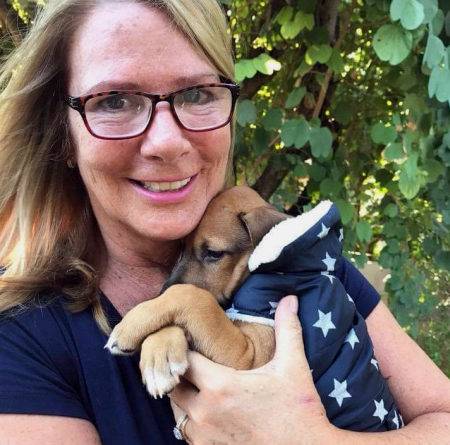A part-time resident of Westport Island is on a mission to rescue street dogs — and most any other animal in need — in Costa Rica.
Caroline Canning and her husband, Jay, have homes in Westport Island, Costa Rica, and Burlington, Vermont, where they own businesses in the hospitality field. The couple has a good life and the means to sit back and enjoy it.
But Canning doesn’t have time to relax. Driven by a lifelong love of animals, both domestic and wild, she dedicates much of her time to saving dogs.
It all started in her childhood hometown of Rawdon, Quebec, when she brought homeless kittens, injured birds, and even a baby snake home.
One particular incident, when a bear and her cub climbed into a tree and town officials shot the mother and tranquilized the cub, left Canning feeling devastated. It may have been the driving force for her life’s passion.
Whenever she came to Westport, Canning would walk dogs at the former Lincoln County Animal Shelter in Edgecomb. That led to the adoption of her dog, Ray, and her eventual involvement with New England Lab Rescue, an organization that rescues dogs from South Carolina.
A few years ago, while vacationing on an island off Nicaragua, Canning was having a hard time relaxing. The island was overrun with homeless dogs and they were being mistreated. The couple took a puppy back to Costa Rica, spent around $1,000 on veterinary bills, and eventually took him back to Burlington, where they found him a permanent home.
Canning was hooked, and since then she has saved around 25 dogs, mostly from the streets of Costa Rica.
Saving a dog isn’t cheap. The Cannings, sometimes with help from Long Trail Canine Rescue in Wilder, Vt., pay up to $150 to fly each dog back to Vermont. Once the pups arrive in Vermont, the rescue organization covers medical expenses.
Other dog rescuers in Costa Rica help pay for medical expenses and veterinary costs in Costa Rica are lower than in the U.S.
“All in all, before the pup goes to its forever home, at least $200 is spent on it,” Canning said.
But aside from cost, she cites education as the most immediate need.
“We have to educate people in order to make change,” she said. “We start by making people aware of how many puppies and kittens can be produced in an animal’s lifetime.” Canning has done some research and the numbers are staggering.
According to the Humane Society of the United States, an estimated 6 million to 8 million homeless animals enter U.S. shelters each year. “Barely half of these animals are adopted. Tragically, the rest are euthanized,” the society says on its website.
While in Costa Rica, Canning spends much of her time working with rescuers Joanne Demis and Amy Lentz.
What money Demis makes acting as a taxi service to and from the local airport she spends on dogs. “She has made dogs her priority,” Canning said.
Demis recently rescued 19 6-week-old puppies from a local family whose three female dogs had litters at the same time.
The family didn’t have the means to care for the puppies, so Demis, with help from Canning, picked them up, took them to a veterinarian, and eventually found homes for them.
“She does what she does quietly,” Canning said. “She’s a hero.”
Canning is saving more than street dogs in Costa Rica. One of the things she loves about Costa Rica is its love of all wildlife. And hunting is illegal.
“Wildlife is highly respected,” she said. “Guns are not part of Costa Rica’s culture. It’s a very progressive country.”
She has come to care for the spider, white-faced, and howler monkeys that wake her up every morning around 4 a.m. “Their howls can be heard for miles,” she said. “It’s like an alarm clock.”
She’s OK with that. She loves them. “They are amazing animals,” she said.
The monkeys use power lines to travel over areas of water, and she recently saw two get electrocuted near her home.
She started working with the local organization Refuge for Wildlife in Costa Rica. “They do amazing things rehabilitating mostly baby monkeys who have been electrocuted,” she said. “Usually the moms don’t survive.”
Canning also now works with a neighbor and fellow monkey lover, Carol Allard, who has had bridges built for the monkeys to allow them to avoid the power lines.
The first time the two met, Allard brought a friend – an employee of the local power company. His crew came, too.
“Minutes after we met, two big trucks with eight or nine guys from the power company showed up,” Canning said. “They said they wanted to meet with me to assess the situation. They asked where we needed to construct monkey bridges. They were there to help.”
Other wildlife Canning includes in her endeavors are raccoons, a few of whom show up every time the Cannings arrive, sometimes hanging around on their veranda. She works to help turtles, coatis, iguanas, snakes, skunks, deer, and gray fox.
“When it comes to animals, I would do anything to help,” she said. “They’re so innocent and they’re more important to me than anything.”
But she can’t do it alone.
“My ultimate goal is to help people understand what is needed to help animals, and to educate them,” she said. “I can transport 10 or 15 dogs from Costa Rica every year to help the situation there, but until we really educate people, nothing is going to change.”
“I love all animals, and that’s a bit of a problem,” she said. “I want to help all of them and not just in Costa Rica, Vermont, or Maine. I want to help them everywhere.
“Any animal, all wildlife, anywhere, is important to me.”
For more information about Costa Rica’s wildlife, visit the Refuge For Wildlife in Costa Rica at refugeforwildlife.org.
Canning welcomes questions and suggestions at carcan43@aol.com.
By Suzi Thayer, Lincoln County News

